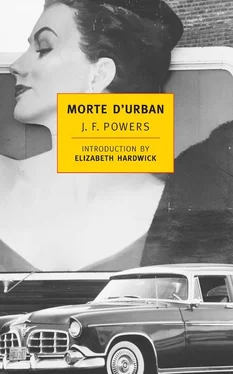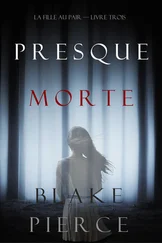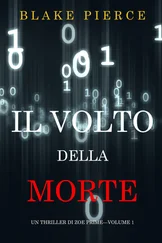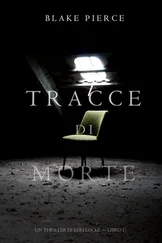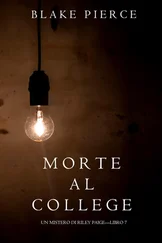“I’m going to subscribe you anyway.”
“Sylvia,” said Mr Bean.
“ Don’t ,” said Father Urban, with a smile, but firmly.
Mr Bean said, “If you don’t mind me asking, Father, how cold does it get in your room?”
Remembering that his sufferings were as nothing compared with those behind the Iron Curtain, Father Urban said, “Let’s just say it gets unbearably cool at times, Mr Bean.”
At this point, Mrs Bean got up and left the table. The atmosphere was such that Father Urban was relieved to see that she wasn’t taking her fur coat with her.
“Father, have you thought of calling in an electrician?”
“I won’t say I haven’t thought of it, Mr Bean.”
“Ray,” said Mr Bean.
“Ray,” said Father Urban.
“But you haven’t done anything yet, Father?”
“No, Ray, I haven’t.”
“Then don’t.”
The next day an electrician who did a lot of work for Ray Bean’s firm came to the Hill and did a rewiring job on Father Urban’s circuit, and there was heat in Father Urban’s room. Wilf, invited in to feel it, shook his head and said: ”I knew it. I was watching the meter go around downstairs.”
The next morning Wilf said, “Don’t have it on any more than you have to, will you?” And that evening, dropping in on Father Urban, he said, “You don’t have to run it on high, do you?”
The next day was Saturday. Early that morning, Wilf said, “Better pack. I’ve decided to send you to St Monica’s, after all. Phil’s been good to us, and you’ll be able to handle some of those speaking engagements you’re turning down now.”
“Whatever you say,” said Father Urban.
PHIL SMITH, PASTOR of St Monica’s, though rather puffy in the face and gray-looking, was still a handsome man. His friend Monsignor Renton, Rector of the Cathedral, was large and pink, with a jug head, splendid white teeth, very blue eyes, and white hair, which, always neatly combed, gave him the look of the good little boy of long ago. Phil and Red were great friends and saw each other two or three evenings a week, usually at St Monica’s.
Father Urban, invited to have a nightcap on his first Saturday there, had since become a regular (as Wilf never had when he was going to St Monica’s) in the upper room. Here everything was pretty much as it had been when Phil and Monsignor Renton were curates at St Monica’s: leather chairs and old books and brown photographs of men and boys dressed for tennis, camping, and touring — these had been the three passions of their pastor, a Philadelphian, who’d not only planned the big brownstone rectory (cherry woodwork throughout, walled-off housekeeper’s quarters, five bedrooms, each with its toilet and bath, among other refinements), but paid for it with his own money, believing that he was to become the first bishop of Great Plains. Unfortunately, the friend who’d been running interference for him in Rome had got into trouble over his friend in France — of course Gallicanism was always a danger with the French, Monsignor Renton said — and the bishopric had gone to another. Brother clergy, still jealous but no longer afraid of the man, had then hung the nickname “Bathroom” on him, and this had proved harder for him to live with, in his big rectory, than the humiliation of having been left at the church “by those Aztecs in the Curia.” So said Monsignor Renton. “Oh yes. He was a convert — from Anglicanism — and believed in fair play. I’d say he died a broken man.”
The church he’d planned had never been built. It would have been the Cathedral, and that was why the rectory was more impressive than the church at St Monica’s.
The effects of that ecclesiastical tragedy were again being felt there, now that the big swamp down the hill was no more, was dry land, now that people were living on it — a surprising number of them young Catholics of rural background, fertile, church-going people. They were Phil’s problems. Most men would have been happy with such a problem, or at least would have dealt with it. Phil wasn’t happy with it, and he wasn’t dealing with it. Phil, who had put off building a church for years, and was still putting it off when Father Urban arrived on the scene, said he didn’t like it that the promoters of Orchard Park had used shots of his church and school as part of the come-on propaganda without a word to him. Phil seemed to think that if he’d been asked for his permission, he might have withheld it, and thus nipped Orchard Park in the bud. Otherwise, he didn’t say much about his problem.
And what did Monsignor Renton, who had made such an excellent first impression on Father Urban, say? He said, “ I blame the state — for draining the swamp.”
Meanwhile, the poor people were standing in the aisles on Sundays. Saturdays, in their way, were worse. Phil just vanished after hearing a few confessions, and Father Chumley, the curate, besides being something of a spook, was a very slow worker. Father Urban, of course, kept his line moving right along, but after a couple of Saturdays at St Monica’s, he had a personal following (this always happened if he stayed long enough in one place), and it didn’t help the situation to have more people coming oftener.
Penitents caught in the bottleneck at St Monica’s went downtown to the Cathedral. Had they been coming from anywhere but St Monica’s, Monsignor Renton would have done something about them, not that he was suffering so much personally. (By custom, he heard confessions only at Christmas and Easter, and yet if the lines did get too long on an ordinary Saturday he might put himself into service for a brief spell, crying “Over here! Over here!” while dusting out his confessional.) Fortunately, the Cathedral curates, two youngsters very much under each other’s influence (and consequently out of sympathy with him, Monsignor Renton said), attributed the overflow in great part to their extreme, and yet still growing, popularity with the laity.
Monsignor Renton, though, by the time Father Urban started helping out at St Monica’s, was beginning to feel the pressure from Orchard Park. On the occasion of their first meeting, which took place in the upper room, he said, “If you ever get the chance, and I don’t always myself, and you never will as long as you come here, watch this ‘All-Star Golf’ at five o’clock on Channel 3.” But then, having said this, he covered for Phil (who was down in the kitchen for ice cubes): “By the way, I think poor Phil suffers from claustrophobia to a certain extent. Fifteen minutes in the box is all he can take.”
Why, though, was Phil so hard to find at other times? Why, Father Urban wondered, was Phil so often out? “Going out for a bit of air,” he’d say, or “Have to get the oil changed in the car,” or just “Have to go out.” When in, he seemed to experience acute pain if the phone or doorbell rang, gave a start, and said, “Oh my!” Then, pretty soon, he’d be gone again. Where did he go? According to Mrs Burns, the housekeeper, he was often seen sitting in the periodical section at the public library, and Father Urban, noting the mileage on Phil’s late-model Plymouth, suspected that he just drove around, using the car as he did the library, to escape — but to escape what? His job, himself, what?
It hadn’t always been that way at St Monica’s, said Mrs Burns, not when Phil’s mother was living. Every morning, Phil’s mother had presented Phil and Mrs Burns and the curate with a list of things to be done during the day, and they’d done them. St Monica’s had been a model parish then.
“Why, I never touched the telephone in those days,” said Mrs Burns, who cleared all calls now, since neither Phil nor Father Chumley would pick up the telephone unless buzzed on the intercom by Mrs Burns. “All I want on my tombstone, Father,” she told Father Urban, “is 6:30, 8, 9:30, and 11.” These were the hours of the Sunday Masses.
Читать дальше
